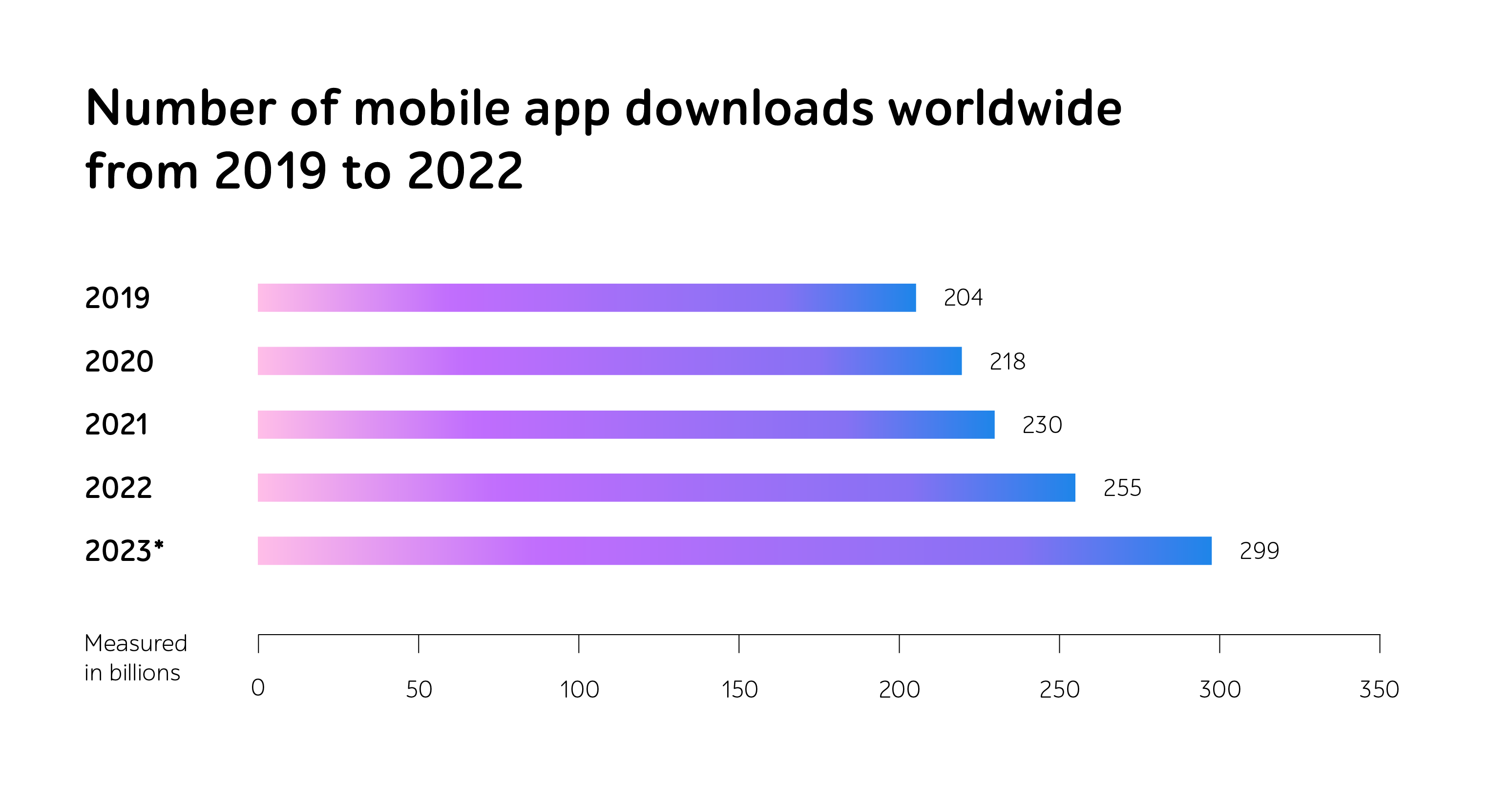
Mobile app testing guide: win the race with five-star software
61% of end users expect the app to load in 4 seconds or less, and 53% of them abandon the software because of its slow start or other mobile-related issues (crashes, bugs, or freezes). This is one of the reasons why companies may need to focus on mobile app testing, helping produce IT products with the minimum number of errors.
In the article, let’s explore everything about mobile app testing: its significance and software aspects that are mission-critical to verify to launch a high-end product.
Why do you need mobile app testing?
Just have a look at this considerable leap. With the rapid proliferation of smartphones, tablets, fitness bands, smartwatches, etc., the number of app downloads reached 255 billion in 2022 compared to 204 billion in 2019. By the end of 2023, it’s predicted to hit 299 billion.

Source: Statista
Mobile apps have definitely become the hub of many industries. For example, eCommerce mobile IT solutions allow shopping online, instantly getting information about the latest promotions, and visiting several stores simultaneously within one click. Users are often impatient and want everything at once, so slow loading and bugs that prevent stable operation may form a negative impression.
Let’s also take the media industry. A clear example of our lives in today’s fast-moving world — whether in the car or on the plane, we use mobile apps to watch news and videos, listen to the radio or music, and write a few lines to friends or relatives. And to catch up with this pace, mobile apps literally need to fly.
To make sure they work as intended and meet customers’ needs, businesses adopt mobile app testing, as it helps enable trouble-free apps operation at any time, under different loads, and across multiple platforms.
Mobile apps testing: what to check?
Unlike web products, mobile ones are much more complex, containing a plethora of functions and more advanced methods of interaction, such as touch actions (e.g., scrolling and swiping) and voice functions (e.g., Siri), which require their constant verification.
Along with that, QA specialists should check the software in different situations: with and without connection or when it’s unstable as well as when switching from one network to another. After all, mobile apps work offline as well. If not testing all these cases, then it may result in numerous errors during the exploitation phase.
Let’s take a closer look at 6 main aspects of mobile solutions that are mission-critical to test to produce a high-quality product and get ahead of the curve with it.
Aspect #1. Functionality
What do people usually do when finding a bug in a mobile app that prevents its further usage? According to the Dimensional Research, 80% of customers won’t use faulty software more than two or three times.
To ensure that the IT solution works in line with the requirements and behaves as intended, companies implement functional testing.
Aspect #2. Performance
Nothing makes end users more excited than stability, especially when it comes to the IT solution performance.
Performance testing allows checking how the app copes with the regular and increased loads, and how it behaves when millions of consumers concurrently carry out online transactions. This is especially true for eCommerce and eLearning solutions to ensure smooth running during Black Friday, Cyber Monday, or just an online lecture with a huge number of students.
Aspect #3. Compatibility
Incorrect display of the interface in different device versions, out-of-screen text, and inconsistency with other smartphone apps — these are some of the defects that arise when using the same software across various platforms. With compatibility testing, QA specialists eliminate these issues and ensure seamless functioning of the IT product across a bunch of devices, operating systems, browsers, and internet connections.
Aspect #4. Usability
97% of users believe that user-friendliness is the most critical quality of mobile apps. Companies may achieve this via usability tests, which are aimed at checking the convenience of software usage and navigation as well as the correct operation and display of all its elements.
For instance, if the company produces an eCommerce app, it’s core to verify the menu layout, product catalog, buttons, and other elements. Are they arranged conveniently? Can the user intuitively find them and perform the necessary actions? If so, then it may be a sign of good software usability that is able to satisfy customers’ needs and provide them with a positive user experience.
Aspect #5. Cybersecurity
Be it a financial, educational, medical, or other kind of an app, they all collect tons of data (addresses, phone and credit card numbers, and even health-related data). With the rapid shift of processes to the online space, more and more personal data is now stored on the web.
With cybersecurity tests, companies ensure strong protection of the software at all levels, eliminate leakage of personal information, and assure compliance with industry-specific and other international standards, such as OWASP, HIPAA, PCI DSS, etc.
Aspect #6. Interruption
Does the app behavior change when interrupted by notifications, messages, incoming calls, and connected or disconnected networks? This is where QA engineers turn to interruption testing, helping make sure that the software handles various types of interventions. Without it, unexpected interruptions may cause interface crashes, data loss, software breakdown, etc.
Test automation to optimize mobile app testing processes
Some tests are too tedious and time-consuming to perform them manually. To meet the project deadline and accelerate the IT product release, test automation is imperative.
Let’s take cross-platform tests, which are indispensable for mobile apps to ensure their smooth running across a variety of devices. It will take an eternity to check all possible combinations manually — thousands (if not millions) of them. In such cases, test automation greatly hastens QA processes.
Performance testing is also a candidate for test automation (to check response time, scalability, speed, etc.). By automating performance tests, experts generate situations with millions of customers who are simultaneously using the software to see if it handles such a heavy load. A typical case of most eCommerce, financial, and eLearning solutions.
Closing remarks
Online shopping, consultations with bank employees, studying from anywhere, just socializing and entertaining — these are some of the reasons why we daily use mobile apps.
Businesses, in their turn, should take exceptional care about their IT solutions quality to provide consumers with the best experience possible (and test functionality, performance, compatibility, usability, cybersecurity aspects, and more).
In case you’re looking for professional support, reach out to a1qa’s experts to fine-tune your mobile app testing strategy to perfection.








